 2008 rang in 10 years of the Open Source Definition along with the 10th anniversary of OSCON. Open Source has come a long way in the last decade. The flag bearers of open source – Linux, Apache, MySQL, Perl, PHP, Python – have matured and are now mainstream. This wealth of open source tools, technologies, and applications was well represented in OSCON’s sessions and discussions.
2008 rang in 10 years of the Open Source Definition along with the 10th anniversary of OSCON. Open Source has come a long way in the last decade. The flag bearers of open source – Linux, Apache, MySQL, Perl, PHP, Python – have matured and are now mainstream. This wealth of open source tools, technologies, and applications was well represented in OSCON’s sessions and discussions.
Sessions I liked
There were some excellent talks highlighting the adoption of open source models and technologies in education, political campaign and voting software, media such as NPR and BBC. The sessions on education, IPR & FOSS economics and women in technology were of special interest to me.
The panel discussion on “Changing Education… Open Content, Open Hardware, Open Curricula” presented initiatives from Africa such as African Virtual Open Initiatives and Resources (AVOIR) and Chisimba. According to Derek Keats of the University of the Western Cape, Chisimba, a local open source project was specifically launched to teach communication, collaboration and coding skills necessary to participate effectively in global open source projects as well as support local requirements. I feel India’s universities could significantly succeed in their goal to produce effective contributors to FOSS, if similar models were adopted. Without having the need to support local requirements (i.e. itch to scratch), it is difficult to develop any open source software locally or produce significant contributors.
I enjoyed Pia Waugh’s talk on “Heroes: Women in FOSS” where she presented the typical stereotypes that women face in technology jobs and best practices for motivating young women early on (grades 8-12) to get into programming and science in Australia. She talked about OLPC being a great platform to get kids to learn to develop using FOSS.
The panel discussion on “Open Source, Open World” provided an unfiltered view of FOSS adoption across the world. Open standards and open source have been intertwined in the past year as the politically charged ODF / OOXML battle has pulled almost every country into the debate at ISO. Nnenna Nwakanma of FOSSFA Africa talked about how bitter the open standards battle has been in Africa with tremendous pressure from large corporations to get OOXML ratified by ISO. Rishab Ghosh of UNU Merit provided an excellent overview of the EU evaluation of open standards and adoption of open source in government. Bruno Souza of Brazil provided an update on pressures imposed on the government ministeries to influence the OOXML vote. I presented a brief report on the tremendous pressure put on committee participants and central government ministeries in India as it voted against OOXML. Another key area discussed was FOSS in education. I talked about FOSS in college curricula being critical to successfully build a sustainable open source ecosystem to create contributors and software. This panel was one of those rare discussions at OSCON that provided a global perspective on real challenges to FOSS adoption. After this panel discussion, I ran across this map showing participants at OSCON to be mostly from the US and Europe. And it seemed to reflect the reality of many lop-sided discussions that happen in technology (even in open source) with minimal representation from the rest of the world.
Tectonic shifts
A key announcement at the conference was that of the formation of the Open Web Foundation (OWF). This non-profit foundation aims to protect and help development of open, non-proprietary specifications for web technologies. David Recordon, a founder of OWF outlined the foundation’s goals in this presentation.
And to do its open source good deed of the year, Microsoft announced its platinum sponsorship of the Apache Software Foundation (ASF) by pledging to donate $100,000 every year to support Apache development. Sam Ramji, Microsoft’s Senior Director of Platform Strategy had an announcement on his blog. ASF put out the following statement on www.apache.org -
“The Apache Software Foundation welcomes Microsoft as a Platinum Sponsor
At OSCON, Microsoft announced their sponsorship of The Apache Software Foundation, joining Google and Yahoo! at Platinum level. The generous contributions by Sponsoring organizations and individuals help offset the day-to-day operating expenses to advance the work of The ASF.”
Here is what Michael Tiemann of the OSI had to say about the announcement and on what Microsoft should can do for open source. I agree with him about what they can start with, namely:
- Pursue the abolition of software patents with the same zeal they showed in their (Microsoft’s) efforts to get OOXML approved as a standard.
- Unilaterally promise to not use the DMCA to maintain control of their Trusted Computing Platform.
- Transition to 100% open standards (as defined by the OSI, IETF, W3C, or the Digistan).
- Stop trying to maintain their monopolies by illegal, anti-competitive means [1] [2].
Actions demonstrate intent and direction. Let us see what Microsoft will do positively with the open source community in action. Let us see which way the wind blows.
 Next week is
Next week is 
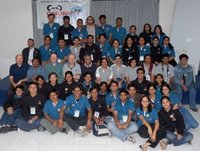
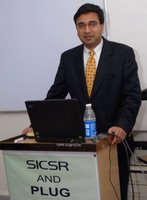 Harshad and his organizing team did a phenomenal job of covering an excellent range of topics in the conference program – from Mozilla Prism, Ruby on Rails, PHP, MySQL, Erlang, Django to visual design tips, network management and security. Every room was packed with spillover seating on the speaker dais. BOFs on
Harshad and his organizing team did a phenomenal job of covering an excellent range of topics in the conference program – from Mozilla Prism, Ruby on Rails, PHP, MySQL, Erlang, Django to visual design tips, network management and security. Every room was packed with spillover seating on the speaker dais. BOFs on 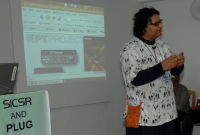 There were a lot of talks I wanted to attend but could only manage to squeeze into
There were a lot of talks I wanted to attend but could only manage to squeeze into 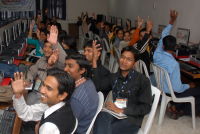 I ended up helping out for the Ruby on Rails workshop by
I ended up helping out for the Ruby on Rails workshop by 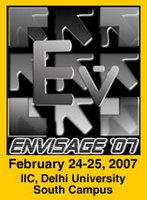 If you happen to be in Delhi next weekend on February 24-25, come and visit Envisage’07, the annual inter-collegiate open source technical festival organized by the students and faculty of the Institute of Informatics and Communications (IIC), University of Delhi. A range of competitive challenges, both technical and non-technical will be held. The event is FREE – so stop by and encourage the engineering students and faculty of IIC and participating teams from all over the country. For more information check out
If you happen to be in Delhi next weekend on February 24-25, come and visit Envisage’07, the annual inter-collegiate open source technical festival organized by the students and faculty of the Institute of Informatics and Communications (IIC), University of Delhi. A range of competitive challenges, both technical and non-technical will be held. The event is FREE – so stop by and encourage the engineering students and faculty of IIC and participating teams from all over the country. For more information check out 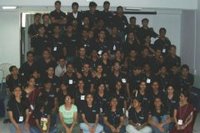 I always feel that Pune has a special buzz especially when it has to do with open source. Students from many colleges and developers from local IT companies such as Infosys, Red Hat, Persistent, Thoughtworks, Celunite all join in to make GNUnify successful. The Pune LUG is also refreshingly participatory and conducts very successful install fests!
I always feel that Pune has a special buzz especially when it has to do with open source. Students from many colleges and developers from local IT companies such as Infosys, Red Hat, Persistent, Thoughtworks, Celunite all join in to make GNUnify successful. The Pune LUG is also refreshingly participatory and conducts very successful install fests!